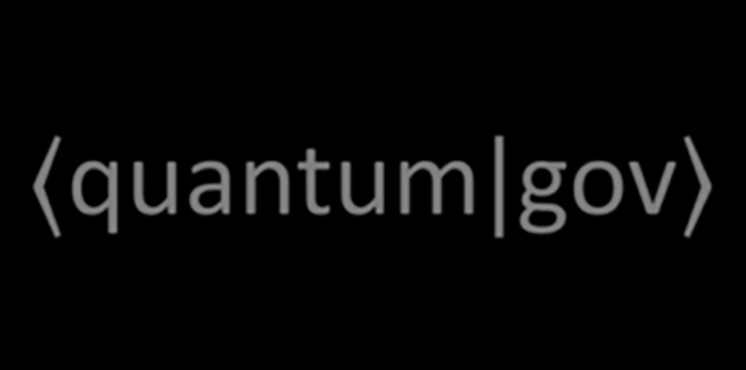Quantum Research Activities
Advancements in quantum research have paved the way for a new generation of technology with several near-term applications in biomedical fields.
Quantum Biomedical Innovations and Technologies (Qu-BIT) Program
NIH Quantum Sensing Technology Challenge – Stage 1 Winners Announced
- We are pleased to announce the winners of Stage 1 of the NIH Quantum Sensing Technology Challenge. The teams will receive $20,000 for their proposals and will be invited to participate in Stage 2 of the Challenge. Congratulations!
NIH Quantum Computing Challenge – Stage 1 Winners Announced
- We are pleased to announce the winners of Stage 1 of the NIH Quantum Computing Challenge. The teams will receive $10,000 for their proposals and will be invited to participate in Stage 2 of the Challenge. Congratulations!
Funding Opportunities
Recent progress in quantum information sciences (QIS) and engineering through the National Quantum Initiative and other international efforts has led to a new generation of quantum technologies that harness the power of quantum physics and engineered quantum states in the fields of sensing, computing, networking, and communications. Of these, the more mature quantum-enabled sensing technologies, as well as emerging quantum computing approaches, can provide promising novel capabilities in early disease detection that can lead to improved diagnostic approaches and enable new computational approaches that are beyond the limits of classical methods.
NCATS established the Quantum Biomedical Innovations and Technology (Qu-BIT) program to support the development of biomedical and translational use cases for the new generation of quantum technologies. Under the Qu-BIT program, NCATS launched two prize challenge competitions (NCATS concept clearance) in partnership with other NIH institutes and centers (i.e., ODSS, NEI, CIT and NIBIB) to spur development in the fields of quantum sensing and quantum computing for biomedical applications.
NCATS Quantum Prize Challenges
The two prize challenges are:
Quantum Sensing Technology Challenge
Atomic-scale quantum sensing technologies provide unmatched sensitivity, precision, accuracy and resolution for studying and measuring biological signals and processes. For example, they offer noninvasive detection of ultra-weak biological signals in vivo and in ultra-low sample volumes. They also are used in bioimaging without photodamage and photobleaching. Despite the advances in these technologies, their use in biomedical fields remains narrow and not well explored. Their real-world use requires further optimization, testing, validation and application to realize translational impact in health sciences.
To address the limitations of technological development and adoption of quantum-enabled sensing technologies to solve translational biomedical problems, NCATS launched the Quantum Sensing Technology Challenge to invite multidisciplinary researchers to submit new biomedical use cases of existing quantum-enabled technologies and to adapt and optimize them for use in biomedical research and clinical settings.
The total prize purse is $1.6 million across the two stages of the Quantum Sensing Technology Challenge. The three areas of interest are:
- Quantum-enabled sensing approaches to advance biomedical applications
- Quantum-enabled sensing approaches for early detection and diagnostics
- Quantum-enabled sensing and imaging devices for diagnostics and monitoring
See the Stage 1 Challenge Winners
Quantum computing offers tremendous potential for solving certain complex computational problems that are beyond the limits of classical computing. Classical computations are limited by binary states, whereas quantum computations rely on multiple quantum states. This difference results in much higher computing speeds. Using mathematical formulations of quantum mechanics, such as entanglement and superposition, new quantum algorithms for improved speed and accuracy of current computations (e.g., simulation, optimization, machine learning) are emerging quickly and may soon be able to transform certain biomedical use cases (Quantum Computing for Biomedical Computational and Data Sciences: A Joint DOE-NIH Roundtable Report).
To identify novel use cases of quantum computing to solve translational and biomedical problems, NCATS launched the Quantum Computing Challenge, inviting multidisciplinary teams to identify and propose novel applications of existing quantum computing approaches to apply toward use cases within clinical, translational and biomedical problem areas.
The total prize purse is up to $1.3 million across the two stages of the Quantum Computing Challenge. The three areas of interest are:
- Quantum algorithms for drug discovery
- Quantum algorithms for clinical risk predictions, diagnosis and therapeutics
- Quantum algorithms for biomedical imaging and genomic data analysis
See the Stage 1 Challenge Winners
Please visit NCATS Prize Challenges for more details.
NIH-Wide Quantum Funding Opportunities
- The NIH Quantum Sensing Technology Challenge
- The NIH Quantum Computing Challenge
- Notice of Special Interest (NOSI)—Quantum Sensing in Biomedical Applications (SBIR/STTR)
- Notice of Special Interest (NOSI)—Quantum Sensing Technologies in Biomedical Applications
- Advisory Council Concept Clearances: (Concept clearance May 2024) (AWAITING UPLOAD). Link to NIH VideoCast for presentation.
Related Links

Office of Data Science Strategy – Quantum Information Science
The Office of Data Science Strategy focuses on improving the use of data across the federal government. It promotes best practices in data science to enhance decision-making and drive innovation.

National Science and Technology Council – National Quantum Strategy
The National Science and Technology Council (NSTC) coordinates the U.S. government's science and technology policy across various agencies. Its goal is to promote innovation and ensure that research supports national priorities.

National Quantum Initiative
The National Quantum Initiative (NQI) aims to advance quantum information science and technology in the U.S. It focuses on research, education and collaboration to strengthen the U.S. position in this emerging field.



